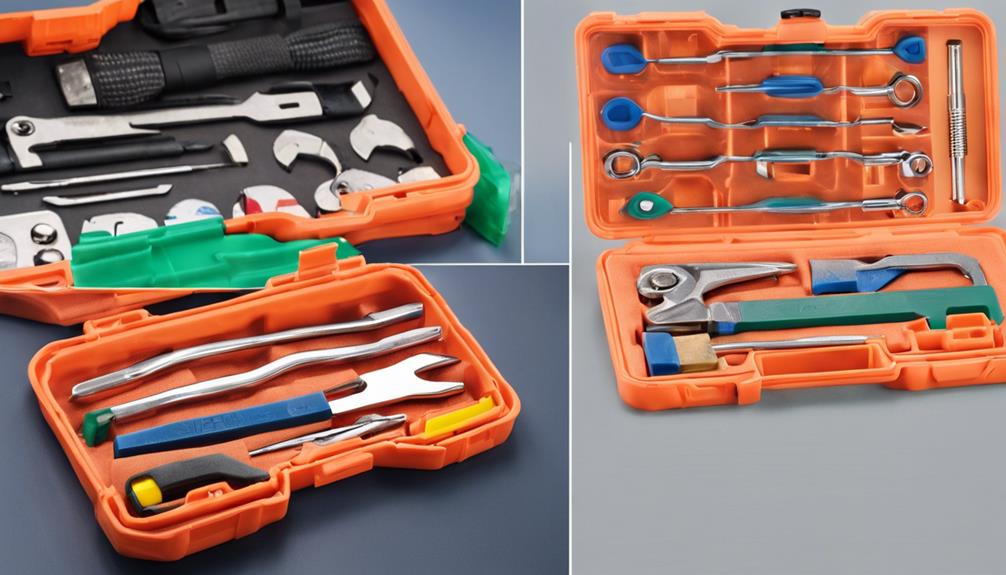When you're comparing DIY and professional-grade re-keying tools, you'll notice some distinct differences. DIY kits are often budget-friendly and easy to use, making them perfect for homeowners. They include basic essentials, like pinning tweezers and tension wrenches. On the other hand, professional-grade tools offer better durability, precision, and efficiency, making them ideal for frequent use by locksmiths or property managers. While the initial cost is higher, the long-term value tends to be better with professional tools. Choosing the right tools for your needs can save time and boost security, and there's much more to explore on this topic.
Key Takeaways
- DIY re-keying tools are budget-friendly but may lack precision and durability compared to professional-grade options.
- Professional tools offer higher quality materials, ensuring accuracy and longevity for frequent use.
- DIY kits are user-friendly, making them suitable for beginners, while professional tools provide advanced features for experienced locksmiths.
- Investing in professional tools can save costs in the long run due to their durability and efficiency.
- The choice between DIY and professional tools depends on budget, expertise, and the frequency of use.
Overview of Re-keying Tools
Re-keying tools are important for anyone looking to enhance their security without replacing an entire lock system. Whether you're a homeowner wanting to guarantee safety for your family or a service provider aiming to assist clients, understanding the options is significant.
When you explore DIY vs professional rekeying tools, you'll find a range of kits that cater to various needs. Many DIY kits include basic tools like pinning tweezers and plug followers, making them user-friendly for those new to the process. However, if you're looking for more extensive solutions, important tools for re-keying can provide added advantages.
DIY kits are often more accessible and cost-effective, allowing you to take matters into your own hands. However, you might question their effectiveness compared to professional-grade tools.
In a rekeying tools comparison, you'll see that professionals typically use higher-quality materials and have more advanced mechanisms, which might result in a more secure lock.
It's essential to compare rekeying kits based on your specific situation. If you're comfortable with the technical aspects and have time to invest, a DIY kit could be a practical choice.
On the other hand, if you prioritize security and convenience, professional tools might serve you better. Ultimately, understanding these differences will help you make informed decisions for yourself and those you aim to serve.
Types of DIY Tools
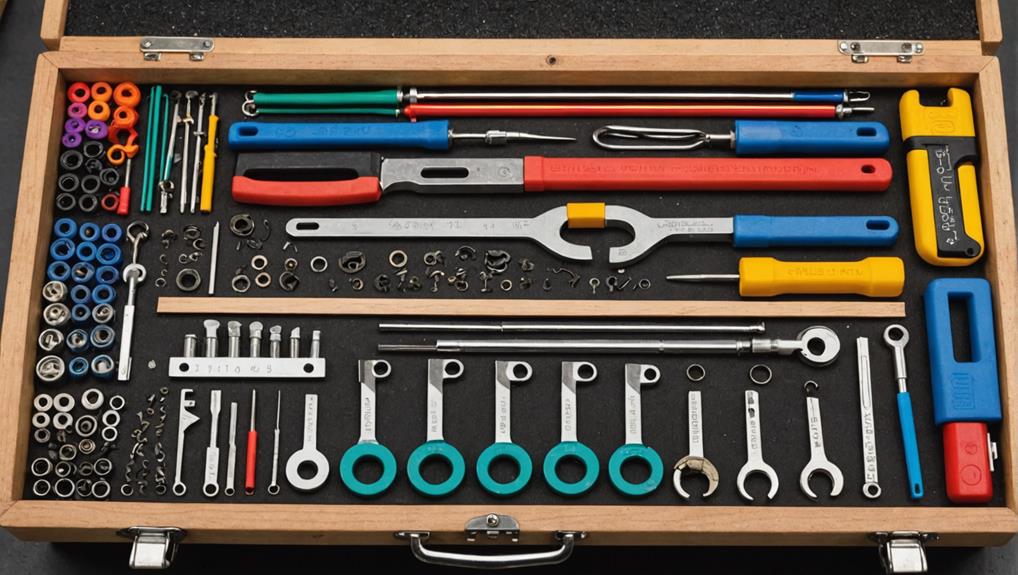
When tackling re-keying projects on your own, it's vital to understand the types of DIY tools available to you.
These tools can help you effectively manage your re-keying needs, and while they mightn't match professional rekeying equipment, they can still get the job done.
For instance, purchasing a reliable re-keying kit can greatly enhance your DIY experience, as you can find essential tips for buying lock re-keying tools that cater to your specific needs.
Here's a breakdown of essential DIY tools you should consider:
- Re-keying Kit: A basic kit usually includes pins, springs, and tools for various lock types.
- Tension Wrench: This tool applies pressure to the lock, allowing you to manipulate the pins without damaging the cylinder.
- Pick Tools: These are used to lift the pins to the shear line, enabling you to re-key the lock.
- Screwdrivers: A selection of screwdrivers is essential for disassembling locks and reassembling them after re-keying.
Types of Professional Tools
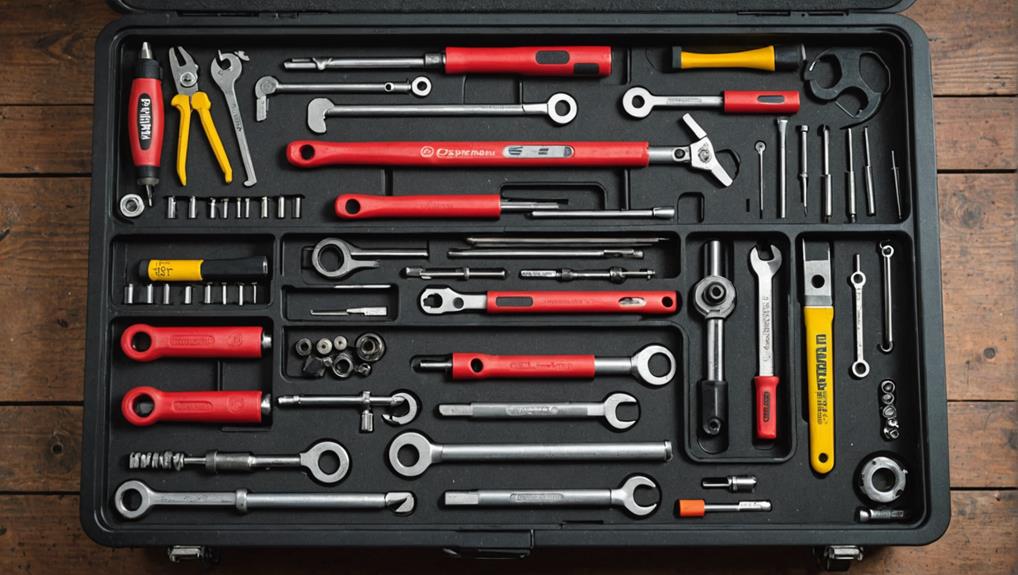
When it comes to professional re-keying tools, understanding the essential components is key to making the right choice.
Professional locksmiths utilize a variety of specialized equipment, such as key extractors and pinning kits, to streamline the re-keying process and guarantee accuracy.
You'll find that professional kits offer distinct advantages, but it's also important to weigh the cost against the value they bring.
Essential tools for locksmiths can greatly enhance efficiency and precision.
Let's explore these aspects to help you decide what's best for your needs.
Essential Tool Components
Precision is key in professional re-keying, and having the right tools can make all the difference. When you're dedicated to serving others, using high-quality tools guarantees that you perform your job effectively and efficiently.
Here are some essential components you should consider for your professional toolkit:
- Pinning Kit: This contains various pin sizes and types, allowing you to accommodate different locks and re-key them accurately.
- Tension Wrench: A must-have for applying the right amount of tension while turning the plug, it's vital for successful re-keying.
- Key Extractor: If you encounter a broken key, this tool helps you remove it without damaging the lock, assuring your clients are satisfied.
- Lock Pick Set: While not always necessary, having a basic set can come in handy for troubleshooting and gaining access to locked doors when needed.
Advantages of Professional Kits
Investing in a professional re-keying kit offers numerous advantages that elevate your locksmithing capabilities.
These kits are designed with high-quality tools that guarantee precision and reliability. When you use professional-grade tools, you're not just performing a task; you're providing a valuable service to your clients, enhancing their security and peace of mind.
One of the standout benefits is the versatility of these kits. They often come equipped with a variety of tools tailored for different lock types, making your job easier and more efficient.
You'll find that professional tools are ergonomically designed, reducing fatigue during long jobs, allowing you to serve more clients effectively.
Additionally, the durability of professional kits means they'll withstand heavy use, saving you from constant replacements.
This long-term investment pays off as you build trust with your customers through consistent, quality work.
Cost vs. Value Analysis
While you might initially hesitate at the price of professional re-keying tools, understanding their long-term value can shift your perspective. Investing in high-quality tools not only enhances your efficiency but also guarantees you provide better service to those who depend on your expertise. The upfront cost can seem steep, but consider the benefits you gain over time.
Here are a few reasons why professional-grade tools are worth the investment:
- Durability: Built to last, they withstand frequent use without degrading.
- Precision: They offer accuracy that DIY tools often lack, guaranteeing a perfect fit every time.
- Versatility: Many professional tools can handle various lock types, making them more adaptable for different jobs.
- Time-Saving: High-quality tools streamline the re-keying process, allowing you to serve more clients efficiently.
When you weigh these factors, the cost becomes less intimidating. Investing in professional tools not only elevates your skills but also enhances your reputation.
Ultimately, providing quality service means you're not just meeting needs but exceeding expectations.
Quality Comparison
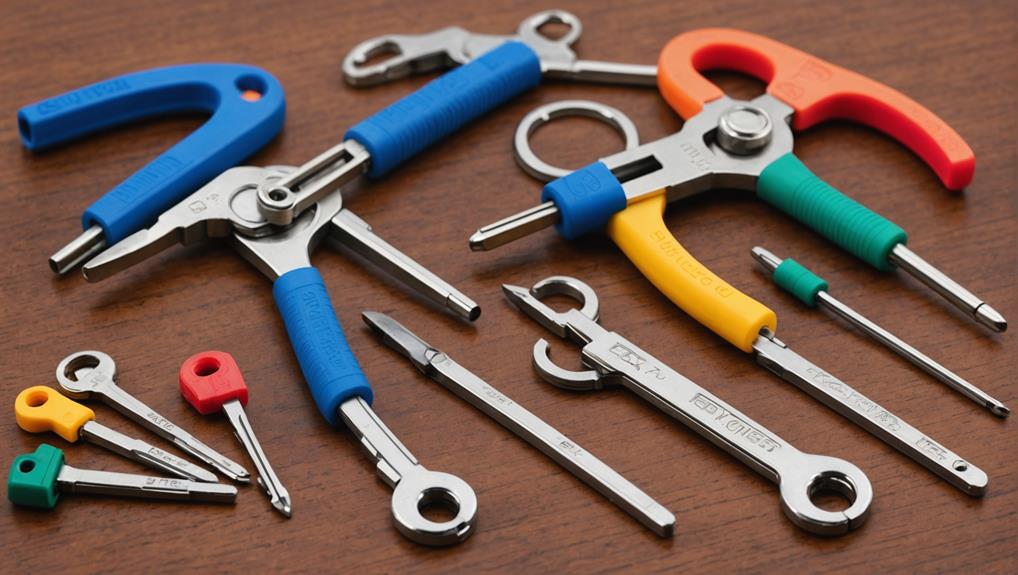
When choosing between DIY and professional-grade re-keying tools, you'll want to contemplate material durability, precision, and accuracy.
These factors not only affect the immediate performance of the tools but also their long-term cost-effectiveness.
In fact, a detailed cost comparison between DIY and professional re-keying services can help inform your decision-making process detailed cost comparison.
Ultimately, the right choice can save you time and money while ensuring reliable results.
Material Durability
The durability of materials used in re-keying tools can greatly impact your overall experience and results. When you're serving others, you want tools that withstand frequent use while delivering reliable performance.
Understanding the differences in material durability between DIY and professional-grade options helps you choose the right tool for your needs.
Here are some key factors to evaluate when assessing material durability:
- Steel Quality: Professional-grade tools often use high-carbon steel, providing strength and resistance to wear.
- Handle Materials: Ergonomic handles made from reinforced plastics or rubber improve grip and reduce fatigue during extended use.
- Finish Coating: A durable finish prevents rust and corrosion, especially when tools are exposed to moisture.
- Weight: Heavier tools tend to be more robust, but reflect on whether the weight will affect your ability to work comfortably.
Precision and Accuracy
Achieving precision and accuracy in re-keying is essential, especially for professionals who rely on their tools to deliver flawless results. When you choose high-quality re-keying tools, you guarantee that every cut and adjustment aligns perfectly with the lock's specifications. This enhances the overall security and functionality of the locks you work on.
DIY tools often lack the fine-tuning features that professional-grade equipment provides. While they might seem adequate for simple tasks, they can lead to inconsistencies that compromise the integrity of the lock. In contrast, professional tools are designed with precision engineering, allowing for exact cuts and adjustments that fit seamlessly.
By investing in professional-grade re-keying tools, you're not just buying equipment; you're enhancing your ability to serve your clients effectively. Accurate re-keying translates to satisfied customers who trust you with their security needs.
Mistakes can be costly, both regarding time and resources, so having the right tools at your disposal can save you from unnecessary headaches.
In the end, prioritizing precision and accuracy helps you uphold your reputation as a reliable locksmith, guaranteeing that your clients receive the best service possible.
Long-term Cost Effectiveness
Investing in professional-grade re-keying tools pays off in the long run.
While the initial cost may seem higher compared to DIY options, the durability and efficiency of professional tools lead to significant savings over time.
When you choose quality, you're not just buying a tool; you're investing in your ability to serve your clients effectively.
Consider the benefits of professional-grade tools:
- Durability: They withstand heavy use and last longer, reducing replacement costs.
- Efficiency: Faster re-keying saves you time, allowing you to take on more jobs.
- Quality Results: Reliable tools guarantee precision, enhancing your reputation for quality service.
- Versatility: They can handle various lock types, making you a more versatile service provider.
Performance Analysis
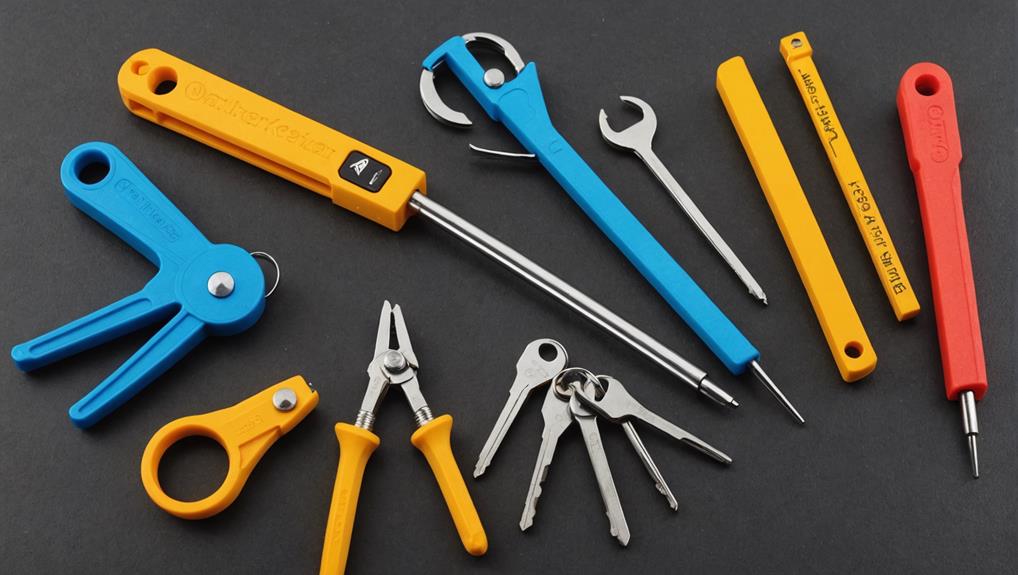
When it comes to re-keying tools, performance can make or break your experience. The effectiveness of these tools not only affects your efficiency but also the quality of service you provide to others. You want reliable tools that deliver consistent results. Here's a quick comparison of some performance aspects of DIY and professional-grade re-keying tools:
| Feature | DIY Tools | Professional Tools |
|---|---|---|
| Ease of Use | Moderate | High |
| Speed of Operation | Variable | Fast |
| Durability | Limited | High |
| Versatility | Basic | Advanced |
| Customer Support | Minimal | Extensive |
As you can see, professional-grade tools tend to outperform DIY options in several essential areas. They're designed for frequent use and can adapt to various lock types. If you're passionate about serving others, investing in superior tools can enhance your ability to meet their needs effectively. In the end, the right choice will not only streamline your work but also guarantee you provide high-quality service with every re-keying task you undertake.
Cost Considerations
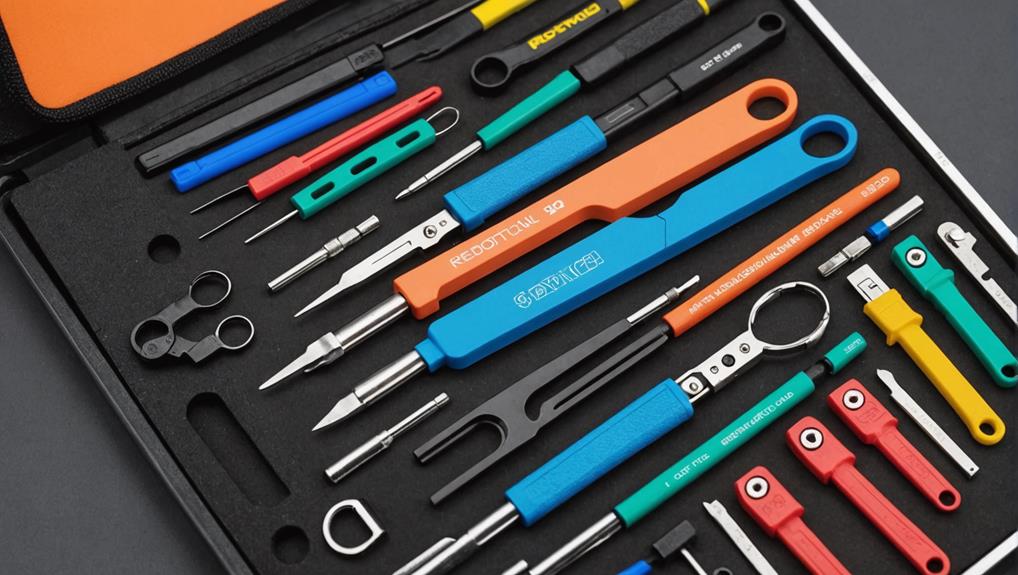
Selecting the right re-keying tools involves more than just performance; cost is a significant factor that can influence your decision. When you're looking to serve others through your locksmith services, it's crucial to balance quality and affordability.
DIY tools typically come with a lower price tag, making them appealing for beginners or those working on a tight budget. However, professional-grade tools often offer better durability and efficiency, which could save you money in the long run. Understanding the lock re-keying costs can further inform your choice between DIY and professional options.
Here are some cost considerations to keep in mind:
- Initial Investment: DIY tools usually require less upfront expenditure, while professional-grade tools might be pricier.
- Long-term Savings: Higher-quality tools often last longer and require fewer replacements, which can reduce costs over time.
- Quality vs. Quantity: Sometimes, spending a little more on a reliable tool can lead to better service and customer satisfaction.
- Training and Support: Professional-grade tools often come with resources or support that can enhance your skills, ultimately benefiting your clients.
Ultimately, weigh the costs against the benefits to guarantee you make the best choice for yourself and those you aim to serve.
Ease of Use
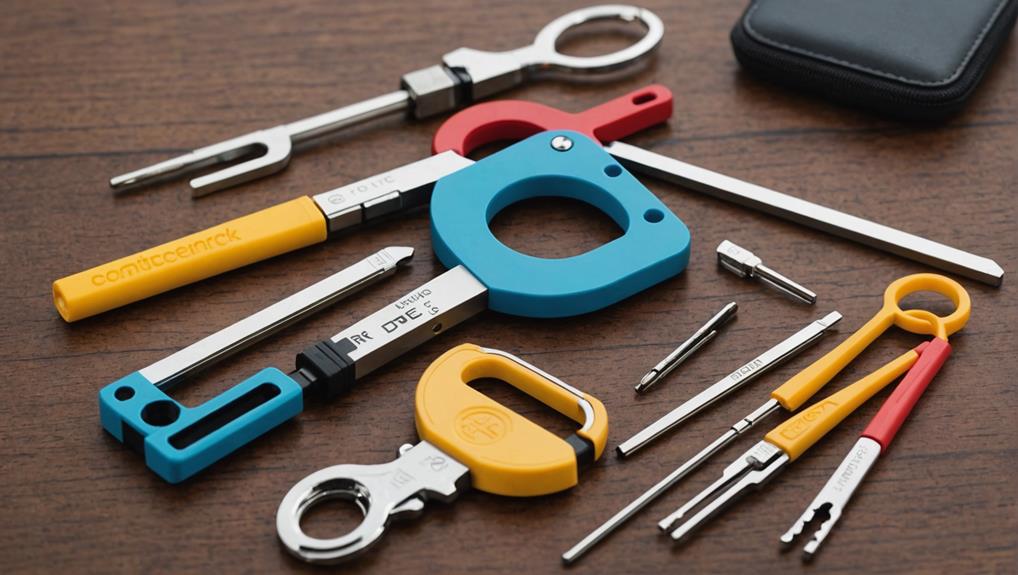
Ease of use is a crucial factor to take into account when choosing between DIY and professional-grade re-keying tools. You want tools that make the re-keying process straightforward, whether you're helping a neighbor or taking on a project for a friend.
DIY tools often come with user-friendly manuals and clear instructions, allowing you to tackle the job with confidence. Many kits are tailored for specific lock types, which can help streamline the process even further; for guidance on selecting the right option, check out choosing the perfect DIY kit. You can quickly get familiar with the components and procedures, making it easier to serve others efficiently.
On the other hand, professional-grade tools might require a bit more expertise. They're designed for frequent use, so while they may offer advanced features, you might find them more complex to operate. If you're looking to assist someone on a tight schedule, you might feel pressured by the learning curve associated with these tools.
Ultimately, if your goal is to help others with minimal hassle, you'll likely appreciate the simplicity of DIY re-keying tools. They empower you to act swiftly and effectively, ensuring you can provide the best service possible without unnecessary complications.
Choose the option that aligns with your confidence and willingness to learn, keeping the needs of those you're helping in mind.
Durability and Longevity
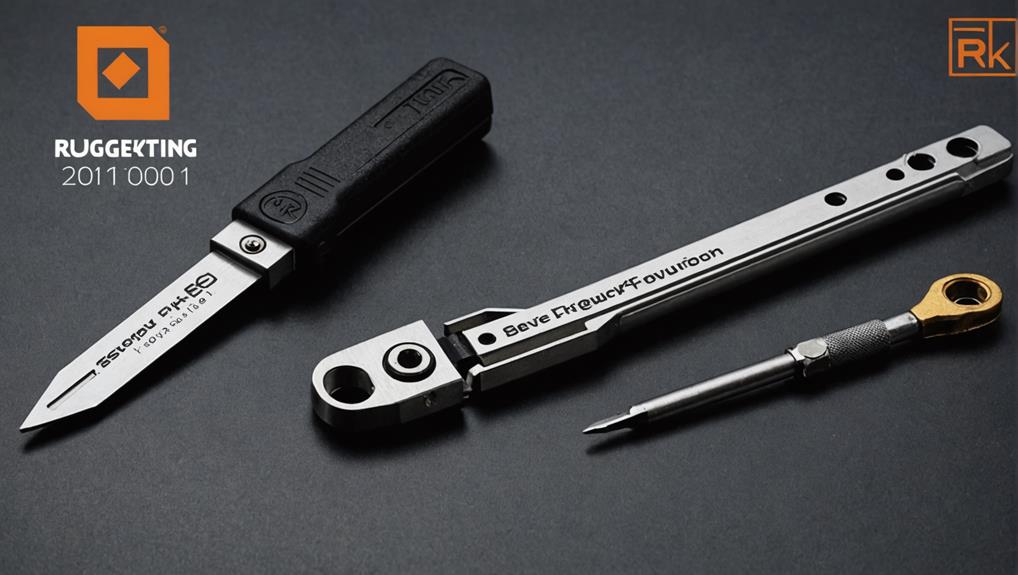
In the world of re-keying tools, durability and longevity are essential considerations that can greatly impact your investment. When you're choosing between DIY and professional-grade tools, you want equipment that won't let you down after just a few uses.
Investing in high-quality tools means they'll withstand the demands of frequent use, ultimately serving you and your clients better. Additionally, understanding the importance of lock re-keying benefits can help you make a more informed decision about which tools to purchase.
Here are a few factors to keep in mind when evaluating durability:
- Material Quality: Look for tools made from hardened steel or other robust materials to guarantee they endure wear and tear.
- Construction Design: Tools designed with fewer moving parts generally have a longer lifespan, reducing the chance of malfunctions.
- Warranty and Support: A good warranty can be a strong indicator of a tool's durability; it shows the manufacturer's confidence in their product.
- User Reviews: Check feedback from other users to gauge how well the tools hold up over time in real-world scenarios.
Safety Features
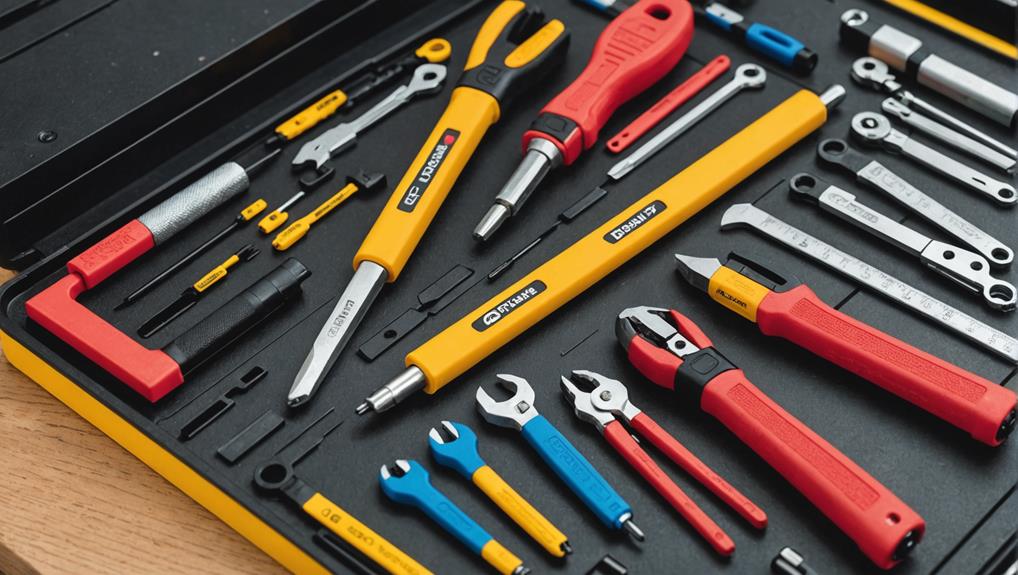
When choosing re-keying tools, safety features should be a top priority. You want tools that not only perform well but also guarantee your safety while you work.
For instance, when dealing with complex lock types, it's essential to have reliable tools to avoid potential security risks; when DIY lock re-keying isn't recommended can guide your choices.
Understanding the durability and reliability of these tools can help you make an informed decision.
Tool Durability and Reliability
Tool durability and reliability play essential roles in guaranteeing safe and effective re-keying, whether you're a DIY enthusiast or a professional locksmith. You want tools that withstand the test of time, allowing you to serve others confidently. Poor-quality tools can lead to mistakes, waste time, and compromise safety.
When choosing your re-keying tools, consider these factors:
- Material Quality: Look for tools made from high-grade materials that resist wear and tear.
- Construction: Opt for tools with solid construction to endure rigorous use without bending or breaking.
- Warranty: A good warranty can indicate a manufacturer's confidence in their product's durability.
- User Reviews: Check reviews from other users to gauge reliability and performance in real-world situations.
Whether you're tackling a simple lock at home or providing a professional service, investing in durable, reliable tools makes a difference. They not only enhance your efficiency but also guarantee you can deliver the best service possible.
When you know your tools are up to the task, you can focus on what matters most—helping others secure their spaces effectively.
User Safety Mechanisms
Choosing the right re-keying tools isn't just about durability; safety features are equally important for both DIYers and professionals. When you're working with locks, sharp tools, and tiny parts, having reliable safety mechanisms can prevent injuries and guarantee a smooth process.
Look for tools with ergonomic designs that reduce strain on your hands and wrists. This helps you maintain control while working, minimizing the risk of accidents. Additionally, features like blade guards or safety locks can protect you from cuts and unintended activation of tools.
For DIY enthusiasts, consider re-keying kits that include safety goggles and gloves. These add-ons shield you from debris and sharp edges, keeping you safe while you serve others by enhancing their security.
If you're a professional, invest in tools that come with built-in safety mechanisms, such as automatic shut-off features or non-slip grips. This not only protects you but also guarantees you deliver quality service to your clients without unnecessary risks.
Ultimately, prioritizing safety mechanisms in your re-keying toolkit allows you to work confidently and effectively, knowing you're safeguarding both yourself and those you aim to serve.
Best Use Cases
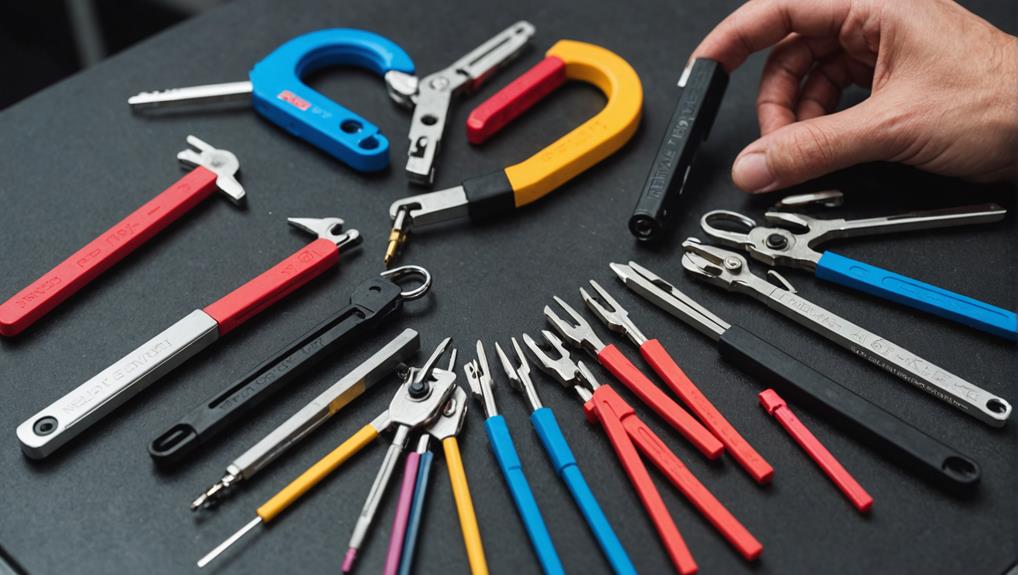
Re-keying tools serve distinct purposes, making it essential to understand their best use cases.
Whether you're a DIY enthusiast or a professional locksmith, knowing when to use each type of tool can enhance your service to others.
For instance, homeowners aiming for improved security can utilize DIY tools effectively, as these options are often more affordable and accessible.
Additionally, DIY versus professional choices can greatly influence the outcome of your re-keying project.
Here are some scenarios where specific tools shine:
- Homeowners changing locks: DIY tools are great for homeowners who want to enhance security without hiring a locksmith.
- Real estate agents: Quick re-keying with professional-grade tools allows you to prepare properties for new tenants swiftly and efficiently.
- Property managers: Use professional tools for managing multiple properties, ensuring that shifts between tenants are seamless and secure.
- Emergency situations: In urgent situations, like lockouts, having the right tool can help you serve someone in need quickly.
Frequently Asked Questions
Can I Use Professional Tools for DIY Re-Keying Tasks?
Yes, you can use professional tools for DIY re-keying tasks, but it's important to take into account your comfort level and expertise.
Professional tools often offer greater precision and durability, which can make your job easier. However, they might be more complex than what you need for simple tasks.
If you're confident in your skills, go ahead and use them—just make sure you follow instructions carefully to achieve the best results for those you're helping.
How Often Should I Replace My Re-Keying Tools?
You should replace your re-keying tools more often than you'd replace your car!
Regularly inspect them for wear and tear; if they're showing signs of damage or inefficiency, it's time for an upgrade.
A well-maintained toolkit not only guarantees your work's exceptional but also helps you serve others better.
Aim to refresh your tools every couple of years, or sooner if you're using them frequently, to keep your skills sharp and effective.
Are There Specific Brands That Are Better for DIY Use?
When you're looking for re-keying tools for DIY projects, some brands stand out. You might want to contemplate brands like Kwikset or Schlage, as they offer user-friendly kits that simplify the process.
Also, look at Weiser for reliable options. These brands typically provide clear instructions and durable tools, making them great for your needs.
With the right tools, you'll feel confident tackling lock changes and helping others with their security needs.
What Materials Are Re-Keying Tools Typically Made From?
Re-keying tools are typically made from durable materials like steel, which guarantees they withstand repeated use.
You'll also find some tools crafted from high-quality plastic, especially for lighter-duty tasks. These materials help maintain precision and reliability during re-keying.
When selecting tools, consider how often you'll use them and the types of locks you're working with. This way, you can guarantee you've got the right equipment for your needs.
Is Re-Keying Difficult for Beginners Without Prior Experience?
Re-keying can be a bit tricky for beginners without prior experience, but it's definitely doable with some practice.
You'll want to familiarize yourself with the process and gather the right tools. Watching tutorial videos or reading guides can really help.
Don't get discouraged if it doesn't go perfectly at first; you'll improve with each attempt. Patience and persistence are key, so keep at it, and you'll gain confidence in no time!
Conclusion
In the end, whether you choose DIY or professional-grade re-keying tools, it often comes down to your needs and comfort level. You might find yourself tackling a simple lock change one weekend, only to discover a newfound confidence that leads you to take on bigger projects. Or perhaps, a professional's expertise could save you time and guarantee your safety. Either way, you're not just changing locks; you're opening doors to new possibilities in your life.

